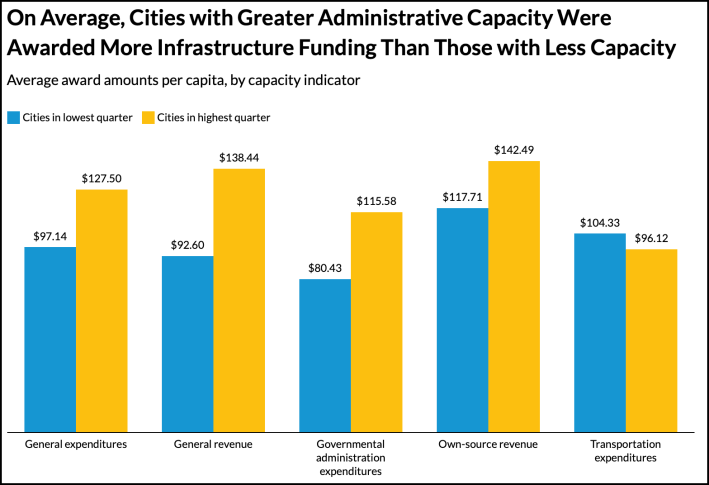The rich get richer.
Cities and municipalities with larger budgets and staff are more likely to win competitive federal infrastructure grants, and those grants are bigger — a vicious cycle for less-resourced communities seeking to upgrade public transit, a new report shows.
According to the Urban Institute report released today, counties with transportation payrolls of just an extra $10 per capita had an 18.1-percent higher likelihood of winning funding from competitive transportation programs.
And that can add up to real money: The two main infrastructure bills in 2021 earmarked $1.2 trillion for transportation, about $550 billion of which for new investments and programs.
The report said that cities with the most general revenues had an average of $138.44 per capita in federal infrastructure grants, while cities with the lowest per capita general revenues received an average of $92.60 per capita.

Authors Amanda Hermans, and Tomi Rajninger, both of the Metropolitan Housing and Communities Policy Center, looked at the government staffing in counties with more than 50,000 residents and compared it to the amount of instructure funding counties received in FY2022 from 29 Infrastructure Investment and Jobs Act programs, plus the US Department of Housing and Urban Development’s Continuum of Care program. They expanded their research to include cities as well.
They found that an increase of five sector-specific employees per 10,000 county residents led to a 3.6-percent increase in the likelihood of winning a transportation grant.
To be clear, this analysis is not claiming causality between a county or municipality's capacity and more funding. The research, however, is providing a snapshot of counties and municipalities in FY22, and shows how counties and cities with higher staffing levels and higher budgets are more likely to have received funding in that period.
“[We were] trying to investigate a potentially crucial inequity that over time is being entrenched into the grant system,” Rajninger said.
The report provides some recommendations to grantors, such as stronger outreach on upcoming grants, streamlining the application process, and more on-the-ground technical support for under-resourced counties and cities.
Federal agencies are already aware, and are working on addressing some of those shortcomings, Hermans said. Amid some complaints about the inequitable disbursement of federal competitive grants, the federal government did announce measures across its agencies to make the disbursement of those funds more equitable.
But this new data provides additional tools to help get communities one step closer to the funding they need.
“A lot of our recommendations were for federal agencies,” Hermans said. “I think they hold a lot of the power in how these decisions get made and how this information gets out there. They have a lot of opportunities to make these processes more accessible for local communities.”






